| |
|
THE SPLIT-SECOND ERROR
...EXPOSING THE WTC BOMB PLOT...
by Fintan
Dunne,
coEditor, PsyOpNews.com
Research
Kathy McMahon
18 September 2001
mailto:%20news@psyopnews.com
VIDEO Windows Mpeg
THE
HIJACK PILOT'S
SPLIT SECOND ERROR
14 mins @
56K
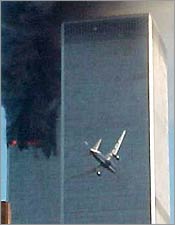
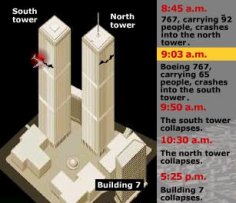
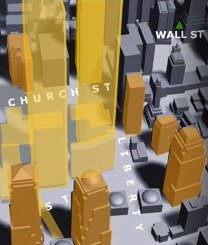
"IT WAS DESIGNED
FOR A PLANE IMPACT"
Aaron Swirski, one of the architects of the World
Trade Center, talks exclusively to Jerusalem Post Radio on the World
Trade Center collapse. He says they designed the towers to withstand
something like a plane flying into the side.
For
interview, Media Player
JpRadio item ...Now
working.
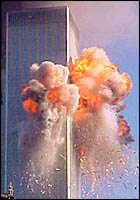 12th September, 2001 12th September, 2001
EXPLOSIVES EXPERT
SAYS
WTC WAS BOMBED
Towers collapse "too
methodical"
CHARGES PLANTED
TO TAKE
DOWN BUILDING
Van Romero, vice president for research at
New Mexico Institute of Mining and Technology says the collapse of
the twin towers resembled those of controlled implosions used in
planned demolition.
"My opinion is,
based on the videotapes, that after the airplanes hit the World
Trade Center there were some explosive devices inside the buildings
that caused the towers to collapse," Romero said.
A demolition expert, Romero is a former director
of the Energetic Materials Research and Testing Center at Tech,
which studies explosive materials and the effects of explosions on
buildings, aircraft and other structures.
He said he and
Denny Peterson, vice president for administration and finance, were
en route to an office building near the Pentagon to discuss
defense-funded research programs at Tech. Romero told the Albequerque Journal that he based his opinion on
video aired on national television broadcasts.
The
detonations could have been caused by a small amount of explosive
put in more than two points in each of the towers, he said. "It
could have been a relatively small amount of explosives placed in
strategic points," Romero said.
BUILDING
COLLAPSE SHOCKS
WORLD TRADE CENTER
ENGINEER,
ARCHITECT
"I DESIGNED IT FOR A 707
HIT"
DETROIT, Sept. 11 (UPI) -- Lee Robertson, the
project's structural engineer, addressed the problem of terrorism on
high-rises at a conference in Frankfurt, Germany, LAST WEEK (!!!),
Chicago engineer Joseph Burns told the Chicago Tribune. Burns said
Robertson told the conference, "I designed it for a (Boeing)707 to
hit it."
UPI
REPORT
DETROIT, Sept. 11 (UPI) -- A lead engineer who worked
on New York's World Trade Center Towers expressed shock Tuesday that
the 110-story lanmarks in Lower Manhattan collapsed after each tower
was struck by a hijacked passenger jetliner.
|
The determined man at the controls of Flight 175 was now less than
one minute from his own demise, and was in that state of heightened
alertness that only approaching death can
generate.
 Ahead, as he hurtled across New York
towards Manhattan Island, he could see the vast plume of smoke (1). His colleague in Flight 11, approaching from the
opposite direction had already made an almost perfect impact on the North
Tower of the World Trade Center. Ahead, as he hurtled across New York
towards Manhattan Island, he could see the vast plume of smoke (1). His colleague in Flight 11, approaching from the
opposite direction had already made an almost perfect impact on the North
Tower of the World Trade Center.
 On the far side of the tower, concealed
from his view, was the gash (2) where the hijacked
airliner had spread its fuel payload over several floors of the building.
Just as the trainers had coached. On the far side of the tower, concealed
from his view, was the gash (2) where the hijacked
airliner had spread its fuel payload over several floors of the building.
Just as the trainers had coached.
But the sight still managed to
unnerve him. It was one thing practicing the approach for countless hours
on a computer simulator, but this was real life -and no mistake could be
made. The planners had insisted that the planes must strike the towers at
a banked angle. Otherwise the fire would be confined to only a couple of
floors and would not set the building comprehensively alight. Without
perfect execution, the imperialists would only suffer minor casualties, he
had been told.
What they never told him was that the aircraft
impacts were only one half of the plan. One visible and psychologically
terrorizing aspect would be provided by the suicidal aircraft. But the
other half of the plan was unknown to the two pilots and their
accomplices. Bombs had already been planted inside both towers.
They would be detonated after the planes had struck, to ensure the
total destruction of the buildings and their evidentiary contents. The
bombs inside the towers were strapped to radio-trigger detonators. Other
plotters would be near the scene -monitoring TV coverage to determine the
right moment to push the final buttons. The full PsyOps (psychological-warfare) effect would be the complete
disappearance of these two symbols of US confidence and power.
But
if the plane struck at the wrong angle, or even worse -missed altogether,
the whole scheme was in danger. Substantial fires were necessary as a
cover for the subsequent collapse.
The planners had taken every
precaution. Their flight approach paths were calculated to align the two
towers as a single target -without a gap between them. His orders were
clear. His target was the South Tower, but if the first plane struck the
wrong tower, he was to switch to the other. In either event, he must
strike at the remaining target with a military precision.
But he
didn't. And that's where things began to go wrong.
BANKING ON SUCCESS
A straightforward level
approach would have been so much easier. Just line up the towers in the
cockpit window and plow straight in. This banked approach was much harder
to accomplish. Imagine swinging a stone on the end of a string, aiming to
strike a standing beer bottle. Imagine getting only one try. A fully laden
767 is like an elephant with wings -the apotheosis of maneuverability.
Now, the pilot was now less than two miles from his target. The
screaming noise of the engines on high power were already causing heads to
turn among the early morning crowds below. But they didn't really
understand what was happening. One eyewitness would later recount that the
first plane had tried to to veer off the tower, but hit it nevertheless.
That witness had mistaken the intent of the final course
correction.
For no matter
how well executed the approach, it would be necessary to make one last
seconds adjustment to get right on target. In the final five seconds, the
tower would still be half a mile away. That's when the collective million
hours of preparation would telescope into seconds and determine the
success or failure of the mission.

Photo 3

Photo 4

Photo 5

Photo 6 |
And it wasn't
going well. As the tower rushed to fill the view in the cockpit
window (3), the pilot realized that he was going too
fast and wide of the target to boot. He would miss to the right. Instead
of a minor tilt of the controls, he would have to lean the aircraft hard
left -NOW! (4)
As the airliner tilted
acutely to the left (5), the air under the wings began
to leak away -depriving the craft of vital lift, even as the extra
centrifugal force generated by the turn meant that he needed more lift
-not less. The maneuver was only partly successful. Despite the course
correction, the plane still drifted to the right.
In that last
instant (6), he never really had time to consider his
own death.  The training and his death-moment concentration focussed him
so intently on the task. With a grinding crash the side of the building
gave way, as Flight 175 struck near the corner of the tower -too far to
the right (7). The training and his death-moment concentration focussed him
so intently on the task. With a grinding crash the side of the building
gave way, as Flight 175 struck near the corner of the tower -too far to
the right (7).
The howl of metal and concrete
impacting each other was overlaid with the crack of plate glass
shattering. The concrete floors of the building cut through the plane like
a egg passed through an egg slicer. The metal in its wings offered little
resistance. In an instant, the plane had disappeared into the tower like a
bird returning to its nest.
But it was no longer an aircraft. It's
separated parts careered across the floors of the South Tower. It was no
longer obeying the laws of aerodynamics. It was subject to the dictates of
the angular momentum caused by the banked approach -and that last moment
course correction.
That's when things began to go even more wrong
for the cynical perpetrators of the mass death that was now being
inflicted on those in the shattered airliner's path.
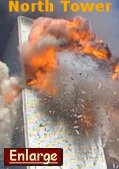
Photo
8
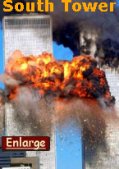
Photo
9
|
THE ARC OF FAILURE
Earlier, the North
Tower impact site had been right in the center of the tower (2). The entire fuel load and flotsam was dumped deep inside
and remained in the building -where it exploded (8)(fig 1
below).
But now as Flight 175 disappeared inside the
South Tower, it burst like a paper bag full of water. The thousands
of pounds of jet fuel were liberated to follow a path dictated by the
momentum of what had once been an aircraft.
A wash of jet fuel and
airplane parts tore through the interior of the building at hundreds of
miles an hour; sweeping everything before it and just starting to ignite
as it rushed along. But it didn't take the same course as had aircraft
debris inside the North Tower, eighteen minutes before. By contrast, the
majority of the fuel and debris from the second plane smashed out of the
building and exploded OUTSIDE in the open air over the street (9)(fig 2 below).
The plane's approach was an arc of
a great circle -one that had tightened even further with that final twitch
on the controls. Imagine again a paper bag of water spun on the end of a
string. If the paper bag bursts, the water inside will head off at a
tangent to the original arc.
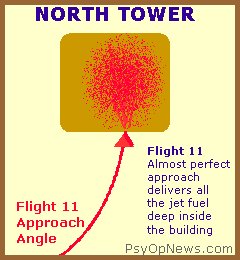
FIGURE
1
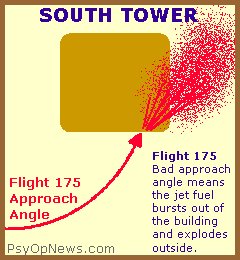
FIGURE 2 |
 In the same fashion, the fuel now tried to take a
course to the right of the original flight path. The aircraft had impacted
near the corner of the building. Within fractions of a second the already
igniting fuel had raced diagonally across the corner to burst out into the
open air again, on the adjacent side of the Second Tower. Photos even show
a smoking engine which shot out as it had not even been slowed by the
building interior (10). In the same fashion, the fuel now tried to take a
course to the right of the original flight path. The aircraft had impacted
near the corner of the building. Within fractions of a second the already
igniting fuel had raced diagonally across the corner to burst out into the
open air again, on the adjacent side of the Second Tower. Photos even show
a smoking engine which shot out as it had not even been slowed by the
building interior (10).
This air explosion
provided a stunning pyrotechnic spectacle witnessed by countless millions,
but it was an operational disaster. For it left the thorny question of
explaining how the South Tower -which took less than half the fuel load of
its North Tower twin -was the first of the two to collapse.(See Fig 1&2)
THE WRONG TOWER
FELL FIRST
Even before the
second plane hit the South Tower, its northern counterpart was already
burning strongly, with a great plume of dense black toxic fumes drifting
over a stunned Manhattan. Flight 11 had rocketed deep inside the building
before the fuel ignited. On some floors the fire burned across the entire
width of the building. By 9:45 a.m. the North Tower was ablaze not just on
the floors that took the impact, but all the way to the top of the
building (10).
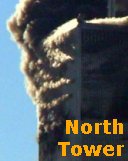 The
towers sprinkler fire extinguisher system were bolstered by automatic
hermetrically sealing doors on every floor to prevent the spread of fire.
But office workers still found themselves stumbling down sometimes
darkened and smoke-filled fire escape stairs. The
towers sprinkler fire extinguisher system were bolstered by automatic
hermetrically sealing doors on every floor to prevent the spread of fire.
But office workers still found themselves stumbling down sometimes
darkened and smoke-filled fire escape stairs.
The giant steel beams
used to build the towers had been cast in Japan -no American steel milll
could roll out the massive 'I' beams. The explanation accepted by the
mainstream media pundits for the collapse of both towers is that these
beams softened like warm toffee in the intensity of the fires.
If
that were the case, then the North Tower was the obvious candidate to be
the first to collapse. Not only did it have almost a twenty minute head
start on the South Tower conflagration, but the fire extended to the whole
area of many floors. The South Tower fire was smaller and more confined,
so that by 10:30 a.m. there was an obvious difference visible to those in
the streets below and the hypnotized TV cameras now trained on the
incredible sight.
But can the collapse in any event be really
blamed on the fires within? The great explosions on impact had consumed
all the jet fuel in seconds. Now it was plastic fixtures, cabling and
internal partitioning that were burning. Or smoldering, to be more
precise. Only near the great gaping holes -where there was access to an
air supply- did the fire burn with anything like the intensity required to
melt great beams of steel.
Neither had the impacts significantly
weakened the structural integrity of the buildings. Even under normal
circumstances these flexible buildings swayed so much in high winds that
seasickness was a noticeable problem among workers on upper floors. Even
on floors near the impact sites, many had felt only a mild shudder as the
aircraft struck.
For the fire to be the cause of the collapse,
most of the array of steel beams that spanned each floor would have to be
engulfed in continuous extremely high temperature fire. This did not
happen, nor was it essential to the plan. If the real intent had been to
collapse the towers by means of fire then the planes would have struck the
corners of the towers nearest to each other. That would have increased the
chances of one tower collapsing into the other.
What actually
happened next -before either tower collapsed, was one or more massive
explosions in the other buildings around the towers. Explosions that sent
clouds of masonry dust into the air. The first of many blasts that would
rock the World Trade Center complex.
The explosions marked the
final phase.
The curtain was coming down on the performance.
And the towers themselves would be next to
fall.....
PART II
THE BLOCKBUSTER
Copyright reserved 2001 www.psyopnews.com by
Fintan Dunne, Kathy
McMahon and PsyOpNews.com
Reproduce freely on noncommercial /
alternative media.
|



 12th September, 2001
12th September, 2001











 The
towers sprinkler fire extinguisher system were bolstered by automatic
hermetrically sealing doors on every floor to prevent the spread of fire.
But office workers still found themselves stumbling down sometimes
darkened and smoke-filled fire escape stairs.
The
towers sprinkler fire extinguisher system were bolstered by automatic
hermetrically sealing doors on every floor to prevent the spread of fire.
But office workers still found themselves stumbling down sometimes
darkened and smoke-filled fire escape stairs.